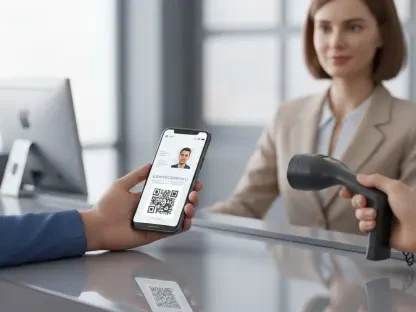In a groundbreaking development for digital identity authentication, Samsung and IDEMIA have partnered to introduce mobile IDs for Iowa drivers. This innovative solution allows residents to store their state-issued identification cards securely within the Samsung Wallet. As digital transformation continues to sweep through various sectors, the integration of mobile IDs marks a significant leap forward in enhancing convenience and security. The collaboration promises to not only simplify identity verification but also to bolster the security framework by leveraging cutting-edge biometric technologies.
The Advent of Mobile ID Technology
Pioneering Integration in Iowa
Samsung and IDEMIA’s collaboration focuses on bringing state-issued IDs into a user-friendly digital format, revolutionizing the way Iowans interact with their identification documents. This initiative, which was first introduced in Arizona, sets a new standard for technological adoption in governmental services. By extending this service to Iowa, the two tech giants are setting a precedent for other states that might follow suit. The move is more than a regional update; it’s a significant milestone in the broader shift towards digital identity solutions, paving the way for future nationwide adoption.The primary goal is to create a seamless and secure environment for identity verification. This is achieved through the integration of mobile IDs into the Samsung Wallet, enabling users to authenticate their identity using their smartphones. The success of the initiative in Arizona provided a solid foundation for expanding into Iowa, where the adoption rate is expected to rise steadily. As residents become more familiar with the technology, the potential for convenience and security improvements becomes increasingly apparent.
User Experience and Accessibility
Iowa residents can now authenticate their identity via Samsung Wallet, making the process smoother and more secure. This new method facilitates a host of everyday activities, from traveling through airport security to purchasing age-restricted products. The simplicity of tapping a phone near a mobile ID reader or scanning a QR code transforms what used to be a cumbersome process into a streamlined experience. The intuitive interface of the Samsung Wallet further enhances user accessibility, making it easy even for those who are not tech-savvy.The platform allows effortless identity verification at various checkpoints, streamlining tasks such as air travel and age-restricted purchases. No longer do Iowans need to carry a physical ID that could easily be lost or stolen. Instead, their digital ID is safely stored in a mobile wallet, protected by advanced security features. This also means that verification becomes a quicker process for businesses and security agencies, as they can rely on technology to instantly validate credentials. With these advancements, the integration of mobile IDs into everyday life is becoming more feasible and appealing.
Security and Convenience Features
Enhanced Security Measures
The integration of biometric security features in Samsung Wallet ensures that digital IDs are protected against unauthorized access. Samsung has long been a leader in incorporating biometric authentication methods, such as fingerprint scanning and facial recognition, into their devices. These features are now being leveraged to protect digital IDs, adding an extra layer of security to the electronic version of one’s identification. This state-of-the-art security provides users with confidence in the safety of their personal information, making the shift from physical to digital ID more appealing and trustworthy.The security measures within Samsung Wallet are designed to be robust enough to deter even the most tech-savvy hackers. Additionally, IDEMIA’s extensive experience in identity solutions further strengthens the security framework. The digital IDs stored in Samsung Wallet are encrypted, ensuring that the data remains secure during transfer and storage. In a world where data breaches are becoming increasingly common, these measures are crucial. By combining Samsung’s technological prowess with IDEMIA’s expertise in identity verification, the initiative offers a secure solution that prioritizes user privacy and data protection.
TSA Endorsement and Implementation
John Bright, TSA’s security director in Iowa, commended the initiative, highlighting its potential to streamline airport security processes. The TSA’s endorsement is a significant vote of confidence, ensuring that mobile IDs can be used effectively at TSA checkpoints in airports like Des Moines and Eastern Iowa. This not only speeds up security checks but also aligns with TSA’s broader strategy to incorporate technology that enhances both security and efficiency. The promising results in Iowa could pave the way for similar implementations in other states, fostering a more tech-driven approach to airport security.Mobile IDs can be used at TSA checkpoints in airports like Des Moines and Eastern Iowa, with future plans to expand to other locations. The TSA’s implementation of mobile ID verification is part of a wider trend towards using technology to enhance travel security and convenience. Early feedback suggests that travelers appreciate the speed and simplicity of using their mobile devices for ID checks. This is particularly beneficial for frequent flyers who value efficiency. The ongoing collaboration between the TSA, Samsung, and IDEMIA is set to redefine the norms of identity verification at airports, making air travel a more seamless experience.
Broader Applications and Benefits
Nationwide Adoption
Residents can utilize their mobile IDs at 25 participating airports across the United States, illustrating the widespread acceptance of this digital solution. As more states look towards digital transformation, the early success in Iowa and Arizona sets a positive precedent. The ease of using a mobile ID could drive nationwide adoption, encouraging more states to integrate such solutions into their systems. The convenience of being able to use the same digital ID across various states and airports significantly enhances user experience, creating a unified and efficient identity verification process.The future of identity verification is leaning towards such technologies, paving the way for harmonized adoption across various states. With the federal government’s increasing emphasis on technology and innovation, the adoption of mobile IDs could soon become a standard practice nationwide. The positive feedback and growing user base in early-adopter states like Iowa and Arizona serve as strong testimonials for the efficacy and security of this technology. As the benefits become more widespread, it’s likely that more states will follow suit, leading to a more uniform and streamlined approach to identity verification.
Beyond Travel: Versatile Use Cases
Besides travel, mobile IDs offer a versatile solution for verifying identity in other scenarios, such as online age verification for certain goods and services. The integration of mobile IDs into online platforms can simplify the verification processes for age-restricted purchases, making it easier and quicker for consumers while ensuring compliance with regulations. This versatility extends to various other sectors, including healthcare, where digital IDs can be used to access medical records securely, and education, where students can use mobile IDs for campus-related activities.The seamless integration into everyday activities highlights the practical benefits of digital transformation in ID verification. The ability to use mobile IDs in multiple contexts not only adds convenience but also reduces the need to carry multiple forms of identification. This all-in-one digital solution is particularly appealing to younger generations who prefer digital transactions and interactions. The broad applicability of mobile IDs underscores their potential to become a universal tool for identity verification, contributing to a more connected and efficient society.
Digital Wallet Evolution and User Trends
Expanding Role of Digital Wallets
Digital wallets, initially designed for financial transactions, are now evolving to store diverse personal credentials, including ID cards and event tickets. This expansion is a natural progression as more people become comfortable with digital solutions for everyday tasks. The multifunctionality of digital wallets is transforming them into essential tools that can streamline various aspects of life. Users can now store not only their payment information but also their identification documents and other credentials in one secure, easily accessible place.This multifunctionality reflects a broader trend toward comprehensive digital solutions in everyday life. The evolution of digital wallets to include diverse credentials is a response to the growing demand for convenience and security in personal data management. By consolidating various forms of identification and credentials in one digital space, users can enjoy a more streamlined, efficient approach to managing their personal information. This trend is particularly significant in today’s fast-paced world, where simplicity and efficiency are highly valued.
Consumer Satisfaction and Adoption
Surveys indicate high satisfaction rates among users, particularly Gen Z and millennials, who are increasingly adopting digital wallets for multiple purposes. The younger generations, who have grown up in the digital age, are more inclined to embrace digital solutions that offer convenience and security. The high adoption rates among these demographics highlight a cultural shift towards digital dependency. As more people become accustomed to using digital wallets for various activities, traditional physical wallets are gradually becoming obsolete.The growing preference for digital wallets signifies a cultural shift towards digital dependency and convenience. This shift is not only evident in financial transactions but also in the way people manage their personal credentials. Digital wallets are becoming central to daily life, offering a convenient and secure alternative to traditional methods. The trend is likely to continue as technology advances and more people recognize the benefits of adopting digital solutions. As digital wallets evolve to include more features and capabilities, their role in modern life will only become more prominent.
Biometric Authentication and Future Prospects
Enhancing Security with Biometrics
The incorporation of biometric features like facial recognition and iris scans significantly enhances the security of digital wallets. These advanced security measures offer a reliable and efficient way to authenticate users, making it difficult for unauthorized individuals to access personal information. Biometric authentication provides an added layer of security that traditional password-based methods cannot match. By using unique physical characteristics, biometric authentication ensures that only the rightful owner can access the digital wallet and its contents.Examples from other regions, such as Mastercard’s biometric checkout program in Europe, demonstrate the potential of biometrics in various sectors. The use of biometric features in different applications highlights the versatility and effectiveness of this technology. From financial transactions to identity verification, biometrics offer a secure and convenient solution that can significantly reduce the risk of fraud and unauthorized access. As more companies and organizations adopt biometric technology, the security landscape will continue to evolve, offering even greater protection for digital assets.
The Road Ahead for Digital IDs
The future landscape of identity verification could see more states and countries adopting digital ID solutions, driven by robust security measures and user convenience. The successful implementation of mobile IDs in Iowa and other states sets the stage for broader adoption. As technology continues to advance, the potential for more sophisticated and secure digital ID solutions becomes increasingly feasible. The ongoing collaboration between technology companies and government agencies will play a crucial role in shaping the future of identity verification.Continuous advancements in biometric technology and digital wallets are expected to shape the future of identity verification. The integration of cutting-edge technologies will lead to more secure and efficient methods of verifying identity, providing users with greater peace of mind. As digital IDs become more widely accepted, the benefits of convenience and security will drive further adoption. The future of identity verification looks promising, with digital solutions poised to become the standard for personal identification.
Conclusion
In a groundbreaking advancement for digital identity authentication, Samsung has teamed up with IDEMIA to introduce mobile IDs for Iowa drivers. This innovative solution enables residents to store their state-issued identification cards securely within the Samsung Wallet, making it a convenient and secure option. As the wave of digital transformation continues to impact various industries, the implementation of mobile IDs represents a significant leap forward in enhancing both ease of use and security. The partnership between Samsung and IDEMIA not only simplifies the process of identifying oneself but also strengthens the overall security framework by utilizing cutting-edge biometric technologies. This collaboration reassures residents that their personal information is protected by state-of-the-art security measures while providing an easy-to-access digital alternative to physical ID cards. As more states and sectors explore digital alternatives, this initiative sets a promising precedent for the future of secure, digital identity verification.









